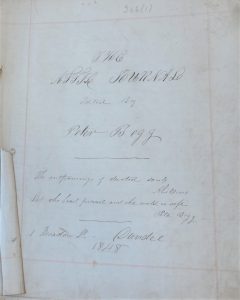
Overview
The Attic Journal, launched in 1848, while not explicitly affiliated with a particular society, was edited by Peter Begg, who was also a member of other literary societies in Dundee. Its readers included John Sime and two members of the Scrymgeour family, also familiar names; as well as a Gow, who may be poet James Gow, and unusually for Dundee manuscript magazines, two women, Miss Cook and Miss Cooper.
Peter Begg was a temperance activist and political campaigner. His convictions are evident in the magazine’s editorial, which was more explicitly class-conscious than many of the other MS magazines in Dundee. The editorial reflects on a sense that that existing magazines’ focus was too narrow both in subject matter and in function, only aiming to improve their own contributors while ‘millions of souls’ existed in ignorance of their own value and with little control over their lives:
“We know that the Journal will not circulate among the class on whose behalf it is originated, but we wish to create a sympathy among our own readers on behalf of their own less fortunate fellow mortals, and this sympathy once established, will extend itself and make its influence felt. […] We chiefly desire to assert the dignity and claim the rights and privileges of man – to reach the hearts of the ignorant and degraded many by homely appeals, rather than captivate, by splendid literary productions, the souls of the intellectual few.”
The Attic Journal is also a particularly good example of how conflict could occur within literary societies, and the ways people reacted to it. They republished a long letter sent by someone writing as “Abillimo” (potentially Begg himself) to the Dundee Natural History and Literary Magazine, defending Begg’s poem “The Bonnie Woods of Luthrie” after it met with harsh criticism there. The ‘hurried and thoughtless’ criticism, Abillimo suspects, must originate from “the debilitating influence of some secret antipathy towards the poet himself. Such ought not to be!” Later, Abillimo makes more general comments on criticism in Dundee literary societies: “Criticism, in M.S. magazines, does no good. It has just now created divisions, and strife in the Lochee Literary Society, and the horrible scenes that took place on magazine criticism night, at the Literary Institute, are beyond description. Believe me, it does no good.” It is likely the strife between Dundee societies was made worse by the fact that so many of them were operating within a very small central area at the same time, probably competing for writers and attention.
Name of Club, Society or Group That Produced the Magazine
(Currently unknown) (Dundee)
Date of Existence
1848?-?
Date of Magazine
Vol. I, No. 1, January 1848
Number of Issues
1
Manuscript/Published Magazine
Manuscript
Contents and Contributions
Editorial; Essays; Letter to ‘Critic’; Poems (original); Title page
Repository
Dundee District Central Library, The Wellgate
Reference
266(1), Lamb Collection
Additional Notes
These magazines were collected in the 1860s by A.C. Lamb, a Dundee temperance hotelier. Many of the societies represented met on premises owned by either himself or, in earlier decades, in his father Thomas’ coffee house. Lamb was often involved in society life himself, and his collection of over 450 boxes covers a wide range of material relating to literature, poetry, culture and politics in Victorian Dundee. For more information on this material, please contact local.history@leisureandculturedundee.com.
